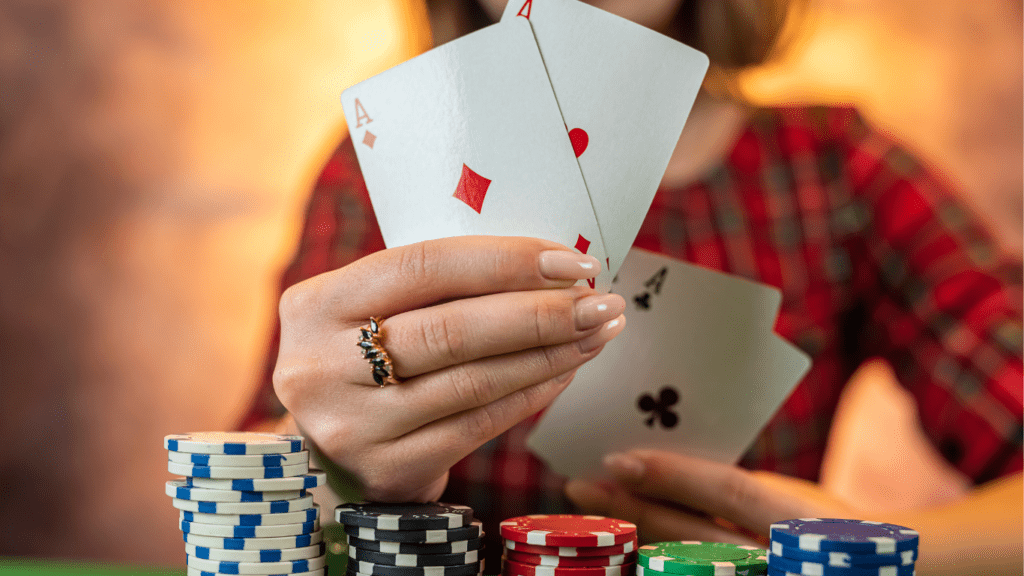Understanding Gambling: The Role of Luck and Skill
Many gambling games combine luck and skill, affecting players’ outcomes differently. In games like slot machines, luck plays a dominant role since the outcomes are random and controlled by algorithms known as Random Number Generators (RNGs). With no strategy altering results, players rely solely on chance.
Conversely, games like poker or blackjack require skill to make strategic decisions. Players analyze odds, employ strategies, and read opponents to gain an edge. Skillful players often outperform beginners, though luck can still influence any given hand.
Understanding the nature of each game is crucial. When luck is the primary driver, it’s essential to accept the unpredictable nature of gambling outcomes. When skill is involved, players enhance their odds through practice and strategy. By understanding the roles of luck and skill, players set realistic expectations and make informed decisions, enhancing their overall gambling experience.
Common Misconceptions About Luck in Gambling
Misunderstandings about luck in gambling often lead to decisions based on faulty beliefs rather than facts. Identifying these misconceptions is crucial for developing a more strategic approach to gambling.
The Myth of the Winning Streak
Many players believe in the concept of a “winning streak.” This leads them to expect continuous success after a series of wins. However, winning streaks are illusions. Each outcome in games like roulette or slots remains independent, governed entirely by chance. The dice or wheels don’t have memory, and past wins don’t influence future outcomes. This myth can result in overconfidence and increased bets, ultimately leading to losses.
Luck as Randomness: The Role of Probability
- Luck in gambling is often mistaken as a mystical force.
- In reality, randomness and probability dictate game outcomes.
- Each roll of dice or card draw has a set probability. For instance, hitting a specific number on a six-sided die stands at 16.67%.
- Recognizing probability’s role highlights that while luck influences short-term results, it’s statistical laws that shape the long run.
- Embracing this reality helps in setting rational expectations and in crafting sound betting strategies.
The Importance of Skill in Gambling
Skill plays a crucial role in many gambling games, setting apart chance-based games from those requiring strategic thinking. Understanding this distinction helps in choosing games that best match your abilities.
Games of Skill vs. Games of Chance
Games of skill, like poker and blackjack, demand strategic analysis and decision-making based on knowledge and expertise. These games allow players to influence the outcome through learned techniques. In contrast, games of chance, such as slot machines and roulette, rely heavily on luck with outcomes dictated by random algorithms or probabilities.
Strategies and Techniques for Skilled Gambling
Developing effective strategies enhances success in skill-based games. In poker, analyzing opponents’ behavior and calculating odds improves decision-making. In blackjack, using card counting and basic strategy optimizes player advantage. Practicing these techniques reduces reliance on luck, providing a competitive edge in skill-focused gambling.
The Psychology Behind Gambling Misconceptions

Understanding the psychology behind gambling misconceptions sheds light on how players perceive luck and skill inaccurately. These misconceptions can influence decision-making and perceptions of control.
Cognitive Biases and Illusions of Control
Cognitive biases, like the Gambler’s Fallacy, trick people into expecting different outcomes than probability suggests. For example, someone might believe a slot machine is “due” for a win after several losses, ignoring that each spin is independent. The illusion of control also plays a role in gambling behavior. Players often overestimate their ability to influence random events, such as rolling dice or picking lottery numbers. This false sense of control can lead to increased risk-taking and persistence in gambling activities.
The Impact of Media and Popular Culture
Media and popular culture shape gambling perceptions by often portraying an unrealistic balance of luck and skill. Movies and television shows exaggerate winning streaks or depict characters mastering games of chance, skewing public understanding. These portrayals create a narrative that luck or skill can consistently lead to success in gambling. In reality, gambling outcomes are governed by randomness and probability, not by dramatic talents or unforeseen good fortune. Understanding this discrepancy helps debunk myths perpetuated by these influences.
Balancing Luck and Skill in Gambling
Balancing luck and skill in gambling involves understanding when each factor plays a dominant role. This awareness lets me maximize opportunities to use skill and minimize the impact of luck on my gambling outcomes.
Identifying Opportunities for Skillful Play
Recognizing skillful play opportunities involves distinguishing games where strategic decisions matter. In poker, my ability to read opponents and dictate betting strategies can affect outcomes. Blackjack requires me to:
- analyze probabilities
- use basic strategy
- sometimes engage in advanced techniques
like card counting. I must constantly assess my skill level and determine when my knowledge provides an advantage. Research and practice are crucial, as they allow me to refine my techniques and confidently engage in games where skill impacts results.
Mitigating Risks Associated with Luck
Mitigating risks in luck-dominated games requires clear strategies and self-control. When playing slots or roulette, I accept that chance governs outcomes. It’s essential to set spending limits and maintain a disciplined approach, ensuring I don’t fall into the trap of chasing losses. By focusing on aspects I can control, like managing my bankroll and timing my sessions, I reduce risks associated with the fluctuating nature of luck. Educating myself on odds and probability further helps to develop realistic expectations and safer gambling habits.



 _____
Bruce Myron – Content Specialist & Myth Buster
Bruce Myron is the storyteller at Play Gambler Cash, specializing in debunking gambling myths and providing clear, accessible insights for the community. With a knack for simplifying complex topics, Bruce ensures that players are equipped with the right knowledge to avoid common pitfalls and maximize their enjoyment.
_____
Bruce Myron – Content Specialist & Myth Buster
Bruce Myron is the storyteller at Play Gambler Cash, specializing in debunking gambling myths and providing clear, accessible insights for the community. With a knack for simplifying complex topics, Bruce ensures that players are equipped with the right knowledge to avoid common pitfalls and maximize their enjoyment.